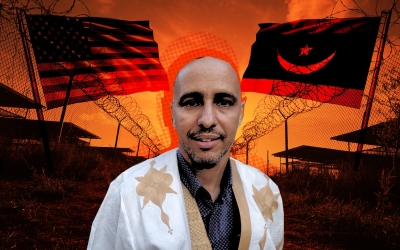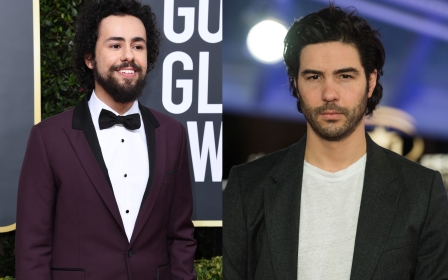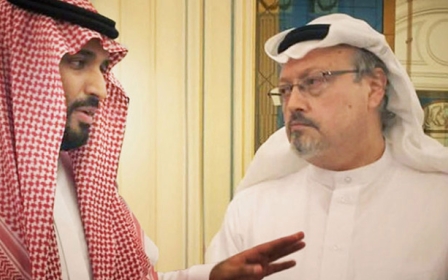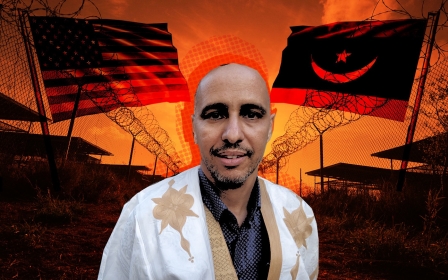Khashoggi documentary and Palestinian film nominated for BAFTAs
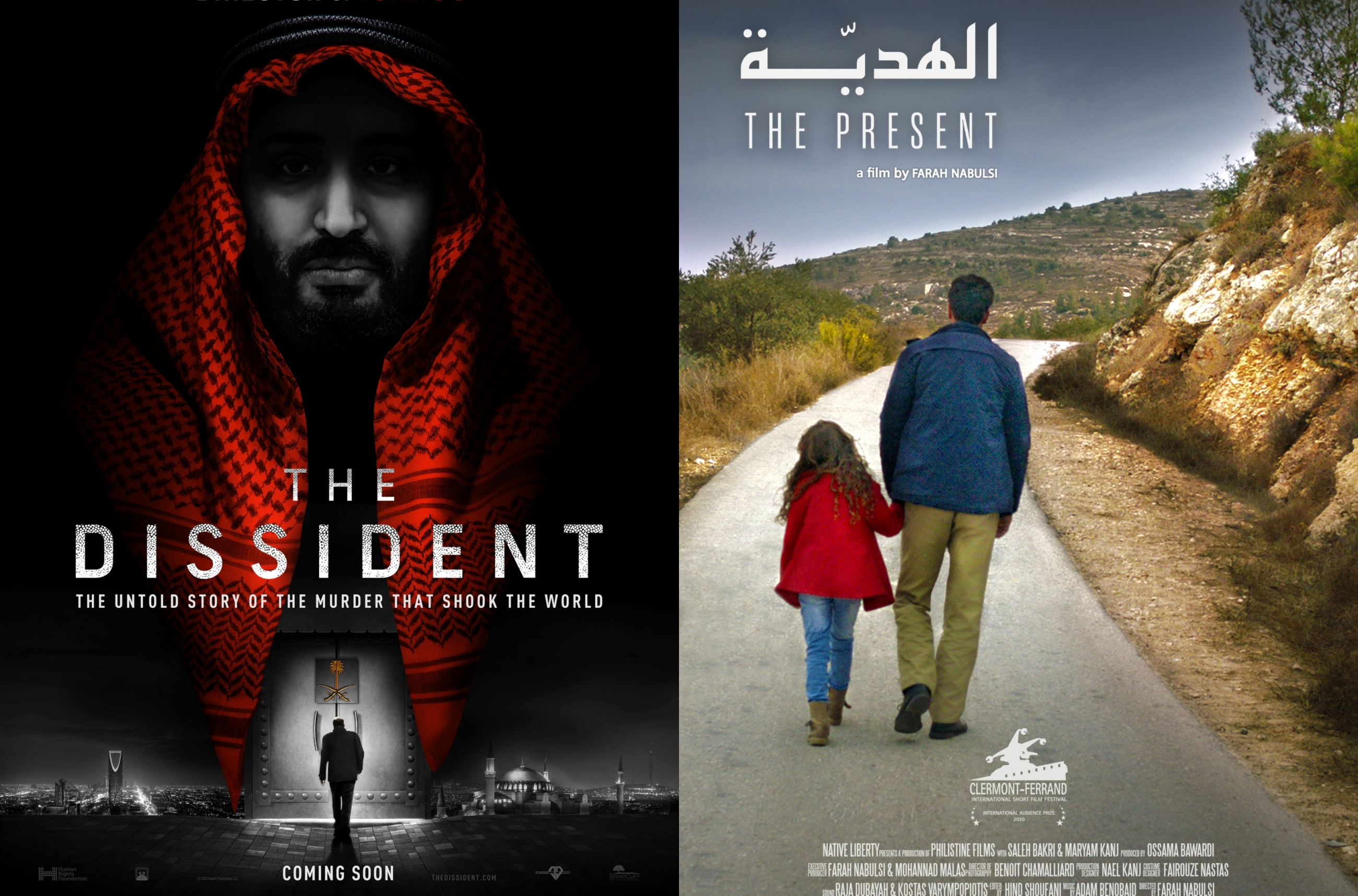
A documentary about the murder of Saudi journalist Jamal Khashoggi, a short film about Palestinians navigating checkpoints in the occupied West Bank and a feature film about a Mauritanian detainee in Guantanamo Bay have all been nominated for BAFTA awards.
The British Academy of Film and Television Arts (BAFTA) released its 2021 nominations on Tuesday, which have been widely praised for their diversity and recognition of ethnic minority groups.
The Dissident, which investigates the brutal murder and dismemberment of Khashoggi, a Washington Post and Middle East Eye columnist who was killed by Saudi agents after entering the kingdom’s embassy in Istanbul in October 2018, was nominated in the best documentary category.
The Mauritanian, a film about a Mauritanian national who was held in Guantanamo Bay for 14 years without being charged, was one of the most recognised films of the year, picking up five nominations.
Meanwhile, British-Palestinian filmmaker Farah Nabulsi’s The Present was nominated for best British short film.
Her 25-minute film explores the trials and tribulations of checkpoints in the occupied West Bank, centering around a Palestinian man who sets off with his young daughter to buy an anniversary gift for his wife.
Nabulsi said the film was inspired by a 2013 trip to Palestine, in which she experienced going through checkpoints herself and spoke to locals who were regularly impacted by them.
“You can portray checkpoints with all the facts and figures - a woman can give birth at a checkpoint; people can’t get to work,” she told Al Jazeera. “But you go stand at a checkpoint, it’s a very different perception to what the facts and figures provide. It was this life-changing trip, it had such an impact on me and I came back and battled with it for two years.”
One of the scenes in the film was filmed at Checkpoint 300 in Bethlehem, in an attempt to show the real-life difficulty faced by Palestinians going about their everyday lives at the hands of Israeli officials.
Nabulsi has produced four other short films, all of which focus on different aspects of Palestinian life, and is currently working on her first feature film.
The Dissident nominated despite troll campaign
Hatice Cengiz, Khashoggi's fiancee, called the recognition of The Dissident a “tremendous honour” that would “keep the memory of Jamal Khashoggi alive and assist our campaign for accountability”.
Earlier this year, the documentary was targeted by a coordinated campaign to post negative comments and ratings on review aggregator sites Rotten Tomatoes and IMDb.
Five hundred bad reviews flooded Rotten Tomatoes in just one day in January, which reduced the film’s score on the website. A representative from the site said there had been “deliberate attempts” to manipulate the score.
Meanwhile, on IMDb, scores of negative comments were left on The Dissident’s page, all raising very similar talking points, calling the film “one-sided” and lamenting the lack of participation from Khashoggi’s family.
Despite the negative campaigns, the documentary has been well received by critics.
Its director, Bryan Fogel, previously won an Academy Award for best documentary for his film Icarus, which shed light on state-sponsored doping in Russia. In January, he criticised major streaming giants for being afraid to distribute The Dissident.
“The decision not to acquire The Dissident had nothing to do with its critical reviews, had nothing to do with a global audience’s appetite to watch a docu-thriller, but had everything to do with business interests and politics and, who knows, perhaps pressure from the Saudi government,” he said.
The film will attempt to become the second Middle East-focused feature in a row to win the best documentary BAFTA, after the Syrian war film For Sama picked up the award last year.
Guantanamo detainee film among diverse nominees
Among The Mauritanian’s five nominations was a nod in the best actor category for French-Algerian actor Tahar Rahim, who was recognised for his lead role as Mohamedou Ould Salahi.
Salahi, a Mauritanian national who entered Gitmo in 2002, was once described as “the most tortured man in the history of Guantanamo Bay”.
The film is based on his bestselling memoir, which details torture methods such as forced sleep deprivation, shackling in stress positions, long bouts of excruciatingly loud heavy metal music and sexual threats against his mother.
Despite being freed in 2016, Salahi told MEE in 2019 that he was still being punished by having his passport taken away, accusing the United States of not wanting him to travel around the world and recount his experiences of detention.
The film portraying his ordeal was recognised in the best film, best British film, cinematography, adapted screenplay and leading actor categories.
After facing a backlash last year for having no women nominated for the best director BAFTA, observers were pleasantly surprised that four women directors were on the shortlist of six nominees this year.
Meanwhile, following no non-white actors being nominated in 2020, a sizeable 16 out of 24 nominees for main and supporting roles this year were actors of colour.
The ceremony will take place on 11 April at the Royal Albert Hall in London, with no live audience due to the coronavirus pandemic.
Middle East Eye propose une couverture et une analyse indépendantes et incomparables du Moyen-Orient, de l’Afrique du Nord et d’autres régions du monde. Pour en savoir plus sur la reprise de ce contenu et les frais qui s’appliquent, veuillez remplir ce formulaire [en anglais]. Pour en savoir plus sur MEE, cliquez ici [en anglais].


